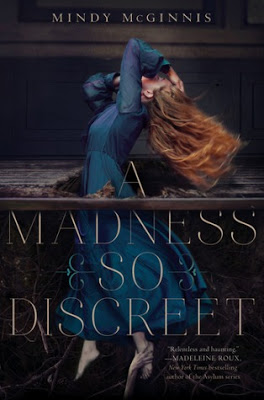Welcome to another session of Turning Pages!
Synopsis: Grace Mae has lost everything – her home, her lovely clothes, her voice – even her last name. Shoved into the faceless void of the late 19the century insane asylum, hers is a life of violence, assault, degradation, starvation, cold, and fear. And, Grace is perfectly sane. Just pregnant… which, for a single young lady of 19th century Boston obviously means wildly licentious behavior, ergo, she is deemed mad. Just until the baby is born, however. All will be mended when her belly is flat again. But, Grace would rather die than go back home – and has decided to stay in the asylum forever. Except, there are worse things at the asylum; there’s the asylum cellar, where the truly mad are kept in unrelieved darkness. When Grace finds herself there, the discovery of unexpected light changes everything. A visiting doctor trained in phrenology and is just beginning a study of criminal psychology sees someone worth saving. Grace is removed to an ethical asylum where her heart begins to heal. Grateful and relived, Grace works hard to help the doctor solve murders – but while his clinical interest and maturity has prepared him for his work, Grace is still young, and still idealistic… What happens when a young girl continues to gaze into the abyss? Eventually, the abyss gazes back…
“It’s a madness so discreet that it can walk the streets and be applauded in some circles, but it is madness nonetheless.”
 NB: As with other reviews on this blog for books in the mystery or suspense genre, the synopsis fails to provide detail, to prevent spoilers. Nevertheless, I feel compelled to state that this book should definitely be only for mature readers. Violence against women, the loss of a childhood, the loss of a child, and murder are pretty common for 19th century asylums, and may trigger negative emotional reactions in some readers.
NB: As with other reviews on this blog for books in the mystery or suspense genre, the synopsis fails to provide detail, to prevent spoilers. Nevertheless, I feel compelled to state that this book should definitely be only for mature readers. Violence against women, the loss of a childhood, the loss of a child, and murder are pretty common for 19th century asylums, and may trigger negative emotional reactions in some readers.
Observations:Months ago, there was a list passed around on Twitter of reasons someone could be – and had been – admitted to an insane asylum in the mid-1800’s. We laughed about it, but it was… creepy. Fits? Desertion of husband? Desertion by husband? Business nerves? NOVEL READING?????? Off you to to the mental institution, and may God help you. Despite the word “asylum” meaning “protection,” the line for any woman between the protection of home, and the loss of all self and all right to leave in peace in this manner was dangerously thin.
“Simply using the words sane and insane is a way for the population to draw a safe line through humanity, and then place themselves squarely on the side of the healthy.”
This Edgar Allan Poe Award Nominee is simply… dark. It isn’t scary in the gasp-and-jerk way, it isn’t spine-tingling horror, and doesn’t leave one breathless with suspense, it’s simply grim. This novel depicts the most common, garden-variety evil, which means it grinds both reader and characters into a paste by the end. The emotion I felt most from this novel was great weariness, and a sense that the conclusion was meant to be cathartic. It was not, for me; it might not be for you. It presented moral conundrums which troubled the adults in the novel; teen readers may feel differently.
The history of America’s treatment of the mental ill is deeply toxic. (America’s present treatment leaves much to be desired, as the stigma still remains.) The topic is somewhat leavened by Grace beginning to enjoy her life and using her prodigious wits to examine crime scenes, but moving into the realm of being a 19th century detective is also somewhat dark – there are those murders, after all. Still, unlike most novels about young women before the idea of equal rights and parity, Grace is not powerless. The novel underscores that, if one is willing to cross the boundaries of societally acceptable behavior, no young woman is. But, are you willing? And, if you’re willing… then, are you sane?
That is the question Grace has to grapple with.
Is justice something which can be meted out by the average person? Is revenge justice? Is there justice in revenge? How much does it matter?
Conclusion: Though some readers may find this painstakingly told story slow, this novel is well-research, well written, refreshingly free of romance, and while it lacks much diversity, it does portray strong female friendships. While I can’t say I liked the novel, as it seems difficult for me to fully embrace provocatively writing about the horrors of the past while many writers consistently ignore violence the horrors of the present, the subject matter is thought-provoking, and the questions of moral relativism it brings will resonate. Do two wrongs ever make things right? But, are you convinced there has been two wrongs…? Each reader must answer for themselves…
I received my copy of this book courtesy of the public library, through the review of my friend Liz who is serving on the Edgar Award panel. You can find A MADNESS SO DISCREET by Mindy McGinnis at an online e-tailer, or at a real life, independent bookstore near you!

This was a disturbing one, but I found it engrossing as well. (Just finished it about a week ago myself.) It is certainly not for the faint of heart, and it does not pull punches about the grim realities of the early history of psychiatry. (The thing about Phineas Gage? Totally true.) In some ways it is a story of empowerment, but not a particularly heartening one, as the avenues Victorian women had to be empowered were so limited.
If you need something less dark, try A Mad, Wicked Folly…